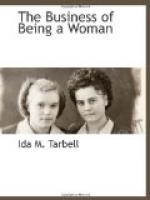The social significance of Hull House is in its relative degree the possible social significance of every home in this land. The realization depends entirely upon the conception the woman in a particular house has of this side of her Business—whether or no she sees neighborliness in this big sense. That she does not see it is too often due to the fact that even though she may have “gone through college,” she has no notion of society as a living structure made up of various interdependent institutions, the first and foremost of which is a family or home.
Absurd as it is, Society, which is founded on the family, is to-day giving only perfunctory and half-hearted attention to the family. The whole vocabulary of the institution has taken on such a quality of cant, that one almost hesitates to use the words “home” and “mother”! A girl’s education should contain at least as much serious instruction on the relation of the family to Society as it does on the relation of the Carboniferous Age to the making of the globe. At present, it usually has less. It is but another evidence of the pressing need there is of giving to the Woman’s Business a more scientific treatment—of revitalizing its vocabulary, reformulating its problems, of giving it the dignity it deserves, that of a great profession. It is the failure to do this which is at the bottom of woman’s present disorderly and antisocial handling of three of the leading occupations of her life—her clothes, her domestics, and her daughter.
CHAPTER V
A WOMAN AND HER RAIMENT
One of the most domineering impulses in men and women is that bidding them to make themselves beautiful. In the normal girl-child it comes out, as does her craving for a doll. Nature is telling her what her work in the world is to be. It stays with her to the end, its flame often flickering long after her arms have ceased their desire to cradle a child. Scorn it, ridicule it, deny it, it is nature’s will, and as such must be obeyed, and in the obeying should be honored.
But this instinct, which has led men and women from strings of shells to modern clothes, like every other human instinct, has its distortions. It is in the failure to see the relative importance of things, to keep the proportions, that human beings lose control of their endowment. Give an instinct an inch, and it invariably takes its ell! The instinct for clothes, from which we have learned so much in our climb from savagery, has more than once had the upper hand of us. So dangerous to the prosperity and the seriousness of peoples has its tyranny been, that laws have again and again been passed to check it; punishments have been devised to frighten off men from indulging it; whole classes have been put into dull and formless costumes to crucify it.
Man gradually and in the main has conquered his passion for ornament. To-day, in the leading nations of the world, he clothes rather than arrays himself. Woman has not harnessed the instinct. She still allows it to drive her, and often to her own grave prejudice. Even in a democracy like our own, woman has not been able to master this problem of clothes. In fact, democracy has complicated the problem seriously.




